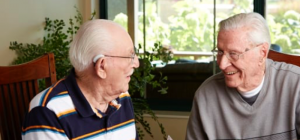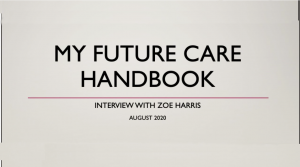
Sometimes, listening and hearing are different skills
Sarah Reed, 27 November 2022
As a dementia communication practitioner, I often think about how we can interact more successfully with people who are living with dementia and how our interactions can also have a positive effect on our other relationships.
The old saying in dementia care – ‘what’s good for a person with dementia, is good for everyone’, is never truer than in listening. Listening to each other with intent and kindness helps us ‘hear’ a person on a deeper level and helps build more loving and meaningful relationships – after all, we all want and deserve to be heard. Effective communication is one of the most important aspects of the care of any person living with dementia. It often means reconsidering how we interact socially and there’s always lots to learn.
Many people think that if a person isn’t communicating, it’s because they can’t understand what’s going on around them, but that’s not necessarily the case. The part of the brain responsible for communication is separate from the part that’s wired for awareness. So even though the person might have difficulty communicating, they may well want to – and can understand the situations they are in.
Caring for a person living with dementia can be a truly formidable task – and of course, few of us are really prepared for it. Apart from being physically and emotionally demanding, it requires the carer to have almost limitless energy, patience, understanding and good humour, in a time-frame that will inevitably be increasingly influenced by the person being cared for. This one-way street can be very stressful for the carer as well, especially as the other person’s mental ability and awareness constantly shifts and declines.
Having said that, it can be immensely rewarding to care for a person with this long-term terminal condition, even as their spoken communication skills deteriorate. Thoughtful connection can make a real, positive difference to their wellbeing – and as importantly, ours to.
Background motion and sound can be both distracting and confusing, so it’s best to be in a quiet environment, with the TV or radio turned off. It helps to make your togetherness equal. Rather than sitting opposite the person, sit comfortably next to, while turned towards the person, as though sitting at a corner table. This means you can turn to look directly at one other and have good eye contact, yet be able to look away, so it doesn’t feel too intense. This helps create a safe space for a shared experience.
Be aware. Notice how the person looks away when thinking and especially when remembering something. How does their mood seem? It helps to attend to physical issues like hunger, thirst, tiredness, or pain first and talk, second.
Allowing time to think in conversation matters. Equally, as the person’s condition deteriorates, their concentration span will reduce, so it’s good to know how long is long enough!
Encourage the person. For any of us, some heartfelt appreciation such as “that’s brilliant!” “you are fantastic!” “what a great story!” “thank you for sharing” are always good to hear. Even though you may have heard the same story many times before, for the person whose self-esteem is diminished by their inability to remember or do things, such support can lift their spirits. Even if admiring words may be forgotten moments later, being positive will make a positive difference to any exchange.
You have the power to make it enjoyable, so try to be in the moment, be playful and use fun and humour. Making every experience as nice as it can be helps both the person struggling to make sense of the world – and you, as well.
You are likely to hear some things repeated and it can be challenging to listen as though it is the first time, but it’s best to avoid reminding the person that they have already told you something, even though you may be near word-perfect. This can require tremendous patience, but it’s always worth it. Try to avoid disagreements about anything, after all, facts are often less important than a person’s feelings.
Empathic connection is what makes for the best relationships – and the best dementia care. Remembering that the person with dementia is a person first, full of rich life experiences helps make listening and hearing easier – and caring for the person more meaningful and rewarding.
Each of the many different types of dementia has its own symptoms and effect on a person and on the way they cope. It’s always good to remember that compassion, kindness and meaningful connection have a major, positive impact not only on the person’s sense of wellbeing and quality of life, but also that of their carers.





No comment yet, add your voice below!